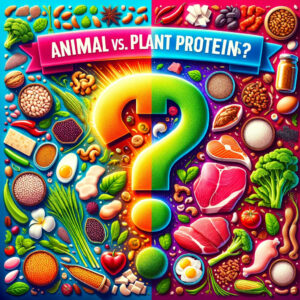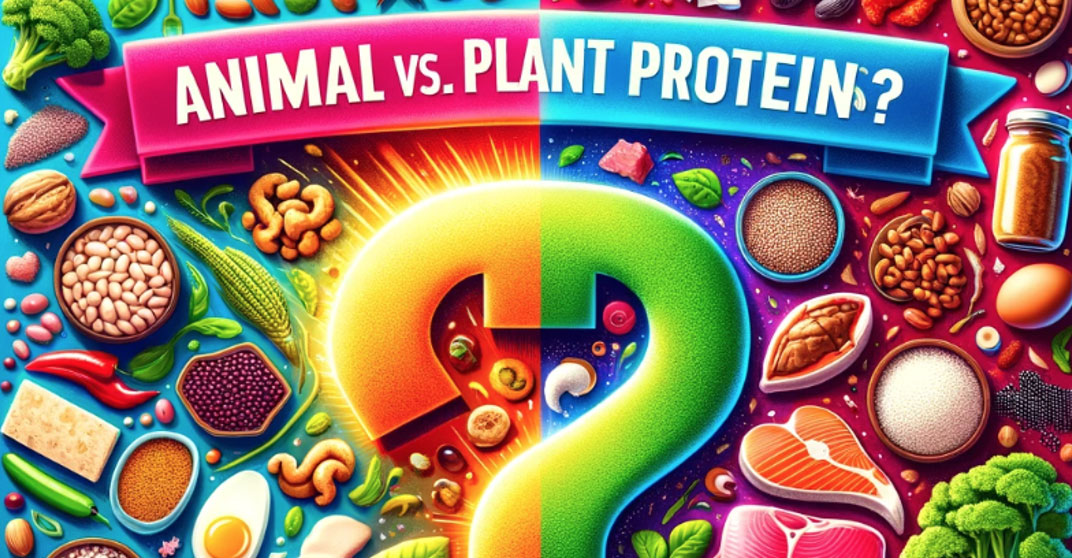In the ongoing debate about dietary choices and their impact on our health, the comparison between animal and plant proteins is a hot topic. Proteins are essential for the repair and growth of cells and muscle tissue, among other vital functions. But does the source of protein really matter when it comes to health? Let’s dive deeper into the benefits of both animal and plant proteins, and explore why plant proteins might just have the edge for a healthier lifestyle.
The Benefits of Animal Proteins
- Complete Protein Source: Animal proteins, such as meat, fish, eggs, and dairy products, contain all nine essential amino acids necessary for the human body. These amino acids are called “essential” because the body cannot produce them, and they must be obtained from our diet. This makes animal proteins a convenient source for supporting muscle repair, immune function, and overall health.
- High in Nutrients: Besides being rich in protein, animal products often contain a variety of other nutrients beneficial for health. For example, red meat is a good source of vitamin B12, iron, and zinc. Fish, particularly fatty fish like salmon, are rich in omega-3 fatty acids, which are crucial for heart health and cognitive functions.
- Satiety and Weight Management: Protein is known for its ability to promote feelings of fullness, which can help in weight management. Animal proteins, with their high protein content and fat, can be especially effective in reducing appetite and subsequent calorie intake, aiding in weight loss or maintenance.
The Benefits of Plant Proteins
- Diverse Nutrient Profile: Plant-based proteins come from a variety of sources, including beans, lentils, nuts, seeds, and whole grains. Each of these sources brings not just protein, but also a unique set of nutrients, including dietary fiber, vitamins, and minerals. This diversity can contribute to a more varied and healthful diet.
- Lower in Saturated Fats: Plant proteins generally contain lower levels of saturated fats compared to animal proteins. High intakes of saturated fats are associated with increased risk of heart disease. By opting for plant proteins, individuals can reduce their saturated fat intake, which is beneficial for heart health.
- Environmental Sustainability: Beyond personal health, plant-based proteins are considered more environmentally sustainable than animal proteins. They require less land, water, and energy to produce and contribute to lower greenhouse gas emissions. This sustainability aspect adds another layer to the definition of “health,” extending it to the well-being of our planet.
Why Plant Proteins Have the Edge
- Chronic Disease Prevention: Studies have shown that diets high in plant-based foods are associated with a lower risk of several chronic diseases, including heart disease, type 2 diabetes, and certain cancers. The fiber and antioxidants found in plants play a significant role in this protective effect.
- Weight Management and Metabolic Health: The high fiber content in plant proteins can help regulate appetite and support weight management. Fiber slows down the digestion process, leading to a more gradual release of glucose into the bloodstream, which can improve insulin sensitivity and metabolic health.
- Ethical and Environmental Considerations: For many, the choice to prioritize plant proteins over animal proteins is also driven by ethical and environmental considerations. Reducing animal protein consumption can lessen the demand for animal farming, which has implications for animal welfare and environmental health.
Seventh-day Adventists believe in living a life that is in harmony with God’s principles, which includes adhering to a diet  that promotes health and well-being. Many Adventists choose a plant-based diet as a way to honor the body as the temple of the Holy Spirit, as suggested in 1 Corinthians 6:19-20, which says,
that promotes health and well-being. Many Adventists choose a plant-based diet as a way to honor the body as the temple of the Holy Spirit, as suggested in 1 Corinthians 6:19-20, which says,
“Do you not know that your bodies are temples of the Holy Spirit, who is in you, whom you have received from God? You are not your own; you were bought at a price. Therefore honor God with your bodies.”
This perspective encourages the consumption of fruits, vegetables, nuts, and grains, as they are seen as the original diet given by God in the Garden of Eden (Genesis 1:29), and are believed to contribute to better health, clearer minds, and a closer relationship with God.
Healthier Eating Tips Inspired by Seventh-day Adventist Practices:
- Incorporate a Variety of Plant Proteins: Diversify your protein sources by including different beans, lentils, tofu, tempeh, and nuts in your meals. Each provides unique nutrients and health benefits.
- Eat Whole Foods: Focus on whole, unprocessed foods to maximize nutrient intake. Whole grains, fruits, vegetables, and legumes are staples of a healthful diet.
- Plan Balanced Meals: Ensure that each meal includes a good balance of macronutrients (proteins, fats, carbohydrates) and a wide array of vitamins and minerals to support overall health.
- Limit Processed Foods and Sugars: Minimize the intake of foods high in refined sugars and processed ingredients, which are often linked to health issues.
- Stay Hydrated: Drink plenty of water throughout the day. Proper hydration is vital for all bodily functions and can help control hunger and boost metabolism.
- Practice Mindful Eating: Eat slowly and without distraction, listening to your body’s hunger and fullness cues. This practice can improve digestion and prevent overeating.
By embracing these principles, individuals can enjoy the health and environmental benefits associated with a plant-based diet, reflecting the Seventh-day Adventist commitment to hope and wholeness.

This article was generated by Ai.
Prompting, editing and curation by Samuel Devries and Hugh Davis
Photo generated by ChatGPT-4









